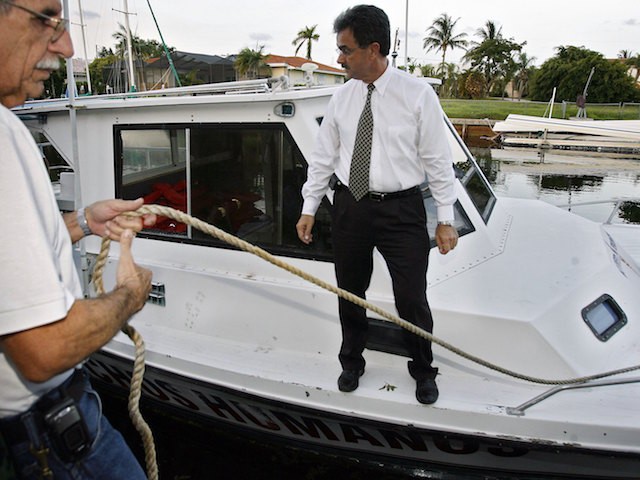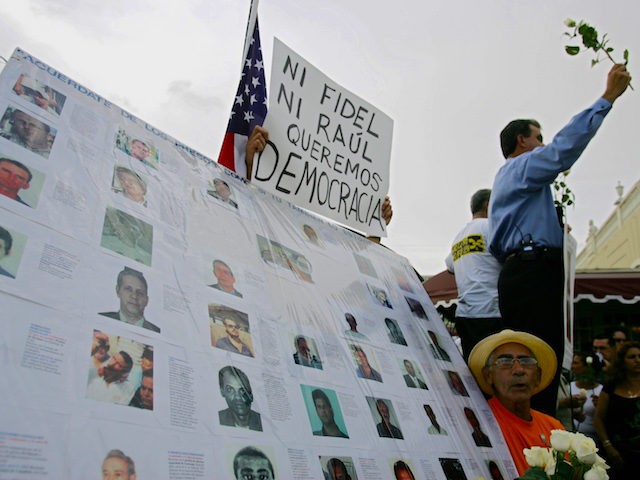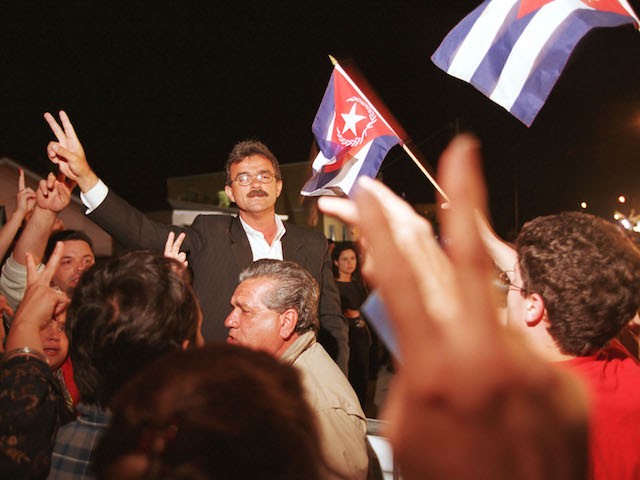Ramón Saúl Sánchez, a Cuban pro-democracy leader who has been active in the struggle against communism for 50 years, recently received notice that the U.S. government denied his request for permanent residence in the country. If returned to the island, “they will execute me or put me in prison for the rest of my life,” Sánchez told Breitbart News.
Sánchez has been in the United States for 52 years. For decades, he has advocated for peaceful acts of resistance against the Castro regime – from hunger strikes to highway sit-ins to the iconic flotillas of the Democracy Movement, Sánchez’s organization, that have for years crossed into Cuban waters to make the point, Sánchez says, that “those waters are ours” on behalf of the refugee community.
He became perhaps most recognizable nationwide during the saga of Elián González, a Cuban boy rescued off the waters of Florida in 2000 whom the Castro regime demanded Washington return to the island, despite his mother dying on a raft trying to help him escape. Sánchez organized prayer vigils and human chains outside the home of González’s Miami relatives meant to keep then-President Bill Clinton’s Immigration and Naturalization Service (INS) from deporting the child. INS agents bludgeoned Sánchez in the head to get him out of the way when Attorney General Janet Reno gave the order to violently abduct González and return him to the communist regime.
He later organized, through his Democracy Movement, flotillas into Cuban waters to protest the regime’s laws banning Cuban refugees from manning ships in parts the Caribbean they controlled. The flotillas were meant largely to commemorate the Cuban refugees who died seeking to reach the United States, particularly the victims of the March 13 tugboat massacre.
Sánchez’s peaceful acts against communism have made him a beloved member of his Miami community. The city of Miami passed a resolution on Friday urging USCIS to reconsider his case. Members of the Cuban and growing Venezuelan refugee communities protested the decision, which puts Sánchez in jeopardy of being deported, in front of Miami’s Freedom Tower on Saturday. A prominent exile rights organization told Breitbart News Sánchez is an “asset” to his community.
Sanchez challenged those who decided he was a threat to his neighbors to reconcile their decision with the backlash against it in Miami.
“They say I am a problem for my community, and it turns out I have massive support in the streets. Otherwise, the [Miami city] commission … isn’t going to defend me against the will of the people,” Sánchez told Breitbart News in a phone interview.
The Cuban activist emphasized that he was extremely grateful to the United States for the opportunity to live in freedom and express his political beliefs.
“I live in this country. I love this country. I defend this country,” Sánchez said. “It hurts that they tell me they don’t want to give me permanent residency. I have spent 52 years in this country working, living off my sweat – not off of any social programs or anything like that. … And then, suddenly, they tell you this, and, you know, it makes your life fall apart.”
Sánchez received special parole as a refugee when he arrived in 1967. He applied to become a permanent resident of the United States in 2002. His application sat in the offices of U.S. Citizenship and Immigration Services (USCIS) for 14 years until 2016 – the year President Barack Obama traveled to Cuba and enjoyed the hospitality of dictator Raúl Castro. That year, suddenly, Sánchez received word that his request was denied and he would soon be deported. He appealed the decision, receiving his final negative response in July.
USCIS told Breitbart News that, in the event potential removal from the country, individuals have a right to a defensive request for asylum, arguing their human rights are in jeopardy if they return to their native country.
The USCIS decision on Sánchez’s case is 17 pages long and detailed his activities against the Castro regime, accusing him of acting not only against Havana, but against Washington. The most prominent examples of anti-American activity the decision accused him of were membership in Alpha 66, a Cuban refugee group planning to fight Fidel Castro in the Cuban mountains in the 1960s, and Omega 7, a Cuban terrorist group he insists he did not belong to; the Democracy Movement flotillas; and the vigils outside of the González home in Miami.
Sánchez insists that his record as a peace activist proves he is not a threat to anyone but the Cuban state. He particularly emphasizes that none of his activities has ever been meant as a statement against America, nor did he know of anyone interpreting them that way before the decision he received on his immigration status this month.
“I started when I was 15 in 1966 with Alpha 66, an organization that believed in sending guerrillas to Cuba to fight like Fidel Castro did, in the mountains,” Sánchez explained to Breitbart News, wryly adding, “Fidel Castro isn’t a terrorist. Fidel Castro is a legendary warrior. The Cuban who opposed him using his same methods is a terrorist.”
Sánchez said he found that the group “wasn’t going anywhere” and left, insisting he “didn’t do anything there,” just train for potential conflict upon returning to Cuba. He was later called to testify in a case involving Omega 7, and, despite not being a member, he refused to speak, he said. That refusal cost him nearly five years in prison.
“The very informant in the case said that I was not a member of Omega 7,” Sánchez noted. He was never found guilty of any accusations of violent activity and only has his one conviction, for civil contempt, on the record.
The Elián González incident is decades removed from the Alpha 66 accusation. By then, Sánchez’s Democracy Movement had established itself through its flotilla protests and responded rapidly to calls for help from the González family against the potential that the Clinton administration would deport six-year-old Elián without due process. Sánchez camped outside the home with supporters of the family, who surrounded the home with protest signs and images of Jesus.
“During [the] Elián [crisis], I told officials to come with an ordinance and take him away. Don’t go in aggressive because there are a lot of people, tensions are high, and you come in aggressive, and there could be repercussions and you can’t control it,” Sánchez recalled. “And, indeed, that is what happened. I stood in front of the door when they came in and they beat me in the head with a firearm, left me unconscious. They took the child over my body.”
Sánchez recalled that the first thing he did when he regained consciousness the night that Reno sent INS agents in to abduct González at gunpoint was to try to make peace, stopping a known agitator from trying to convince the crowd to throw rocks at CNN reporters.
“In times of crisis, we [the Democracy Movement] have been a factor in reconciliation,” he argued.
“Perhaps more than anyone else, he has kept in check the violent leanings of the Save Elian coalition, which includes a continuum of groups from liberal-minded critics of Cuban socialism to Castro-loathing zealots,” the leftist Miami New Times said of Sánchez at the time, a rare compliment across the aisle during one of the most heated political crises of the current century.

MIAMI – AUGUST 02: Norman DelValle (L) and Ramón Saúl Sánchez prepare their boat named Derechos Humanos August 2, 2006 near Miami, Florida. (Photo by Chip Somodevilla/Getty Images)
“I directed protests during Elián González, and they [the U.S. government] considered us the moderate faction. When we brought people out, we ensured people didn’t commit any extreme acts. We wanted the families, not the governments, to decide the case,” Sánchez insisted to Breitbart News.
The Democracy Movement flotillas were similarly peaceful, symbolic gestures of entering Cuban waters as members of the Cuban diaspora to stake a claim in the history of the Cuban people. He recalled to Breitbart News a specific flotilla organized in response to the sinking of the March 13 tugboat.
On July 13, 1994, 63 Cubans fled towards America on the March 13 tugboat. The Cuban government intercepted the boat – even though Havana triggered the balsero (“rafter”) wave into the United States following the collapse of the Soviet Union – and used pressurized water hoses to sink it. Of those onboard, 41 died, including at least ten children. The youngest was six months old.
“We went to remember the children murdered on the March 13. … The Cuban regime was very upset by that, and the United States government created a presidential decree against us so that we couldn’t enter Cuban waters – our waters,” Sánchez explained. The group went into Cuban waters to demand Havana pull up the remains of the victims and send them back to the families and to urge the world to act against the murderous regime.
Asked what specifically the people on the boats were out in the Caribbean doing – if they posed a threat to Cuba or the United States – Sánchez said, “Throw flowers.”
“We went into those waters because those are our waters. I’m Cuban. I ask people of other nationalities: if somebody from another country told you that you can’t enter your own waters, who is right: the one who tells you you can’t go in, or you?” Sánchez asked. “If the dictator of your country tells you that you, as a Cuban, cannot enter your own country, in your own waters, because your ideology is different than his, who is right – the dictator who takes away your internationally recognized right, or you as a citizen?”
Sánchez predicts a death sentence of life in prison for him should he be deported.
“Definitely, if they send me to Cuba, they will shoot me [before a firing squad]. … They think that I am the worst. … They will execute me or put me in prison for life,” he said.
Sánchez’s case has risen to the spotlight at a time in which opposition to the deportation of children seeking asylum in America has become a prime topic of discussion on the American left. Prominent Democrats have joined a mounting call on the left to abolish Immigration and Customs Enforcement (ICE), the successor agency to the INS that violently attacked Sánchez to deport Elián González. Leftist groups have protested outside of ICE detention centers, claiming children entering the country illegally have a right to stay.
None of the prominent activists claiming to stand for migrant children today has said a word in defense of Sánchez, who personally faces deportation for, in part, having opposed violent child deportations. No Democrat 2020 candidate has mentioned his case. The high-profile young Democrat group that calls itself the “squad” – Rep. Rashida Tlaib (D-MI), Rep. Ilhan Omar (D-MN), Rep. Alexandria Ocasio-Cortéz (D-NY), and Rep. Ayanna Pressley (D-MA) – has not made Sánchez’s potential deportation a cause celebre. Allegedly pan-Latino pro-immigrant groups have remained silent.
Sánchez has enjoyed significant support, however, from Latino activists and government officials in Miami. Last week, the government of the city of Miami passed a resolution “urging the United States Citizenship and Immigration Services (USCIS) to reevaluate and grant Ramón Saúl Sánchez’s application for permanent resident status.”
“I have the highest hope that the government will use this as the backing of a community, of a city, not just of one person,” Mayor Francis Suárez told Miami-based TV Martí:
Ramón Saúl Sánchez, who has dedicated his life to fighting for human rights in Cuba, has been denied permanent residence in the U.S. Today, we passed a resolution urging @USCIS to reconsider and grant him residency. His legacy as an advocate for freedom deserves this status. pic.twitter.com/r4hE6hEbMk
— Mayor Francis Suarez (@MiamiMayor) July 25, 2019
The next day, anti-communist Latinos in Florida gathered in front of Miami’s Freedom Tower in support of Sánchez. In addition to members of Cuban exile groups like the 2506 Brigade – the group that fought at Bay of Pigs – the president of the Organization of Politically Persecuted Venezuelans in Exile (VEPPEX) also made an appearance.
“Supporting our brother in the Cuban exile community,” Ramón Saúl Sánchez. The administration of President Trump should give him permanent resident status. We support you brother!” VEPPEX leader José Antonio Colina wrote on Twitter:
Apoyando a nuestro hermano del Exilio Cubano, Ramón Saúl Sánchez. La administración del Presidente Trump debe devolverle su residencia. Te apoyamos hermano! pic.twitter.com/8lD7rdEqJf
— Jose Antonio Colina (@JoseColinaP) July 27, 2019
True Channel en La Torre de la Libertad mas de 100 amantes de la Democracia le pidio a los Estados Unidos de America que le otorgen la Residencia a Ramon Saul Sanchez.
Aqui estoy con Johnny Lopez de la Cruz Presidente de la 2506. Cero oficial de Hialeah o Miami Dade llegó. pic.twitter.com/h3ccxvSHDR— Julio Martinez (@SgtJJMartinez) July 28, 2019
Cuban anti-communist groups in and out of the island have expressed their support, vouching for Sánchez as a worthy permanent resident of the United States.
“Ramon Saúl Sánchez represents a generation of Cubans in America with a deep lifetime commitment to the rights and freedoms of the Cuban people,” Orlando Gutiérrez Boronat of the Miami-based Cuban Democratic Directorate told Breitbart News. “He is a profound, responsible, and hard-working man and a pillar of his community; his legal and permanent residence here is an asset to the United States.”
The head of the Patriotic Union of Cuba (UNPACU), believed to be the largest dissident organization openly operating on the island, published a video on Youtube urging USCIS to reconsider Sánchez’s case.
“We think that this decision is incorrect,” José Antonio Ferrer said. “This is a defender of freedom, democracy, and human rights. An enemy of communism – the same communism that has so attempted against the freedom of our continent and so much harm has done to the United States.”
“Not only do many Castro agents obtain residency,” Ferrer claimed, but “they even become citizens of the United States to act from within against that great nation. It is truly disconcerting to us that, while they deny permanent residence to this honest person … people who do not really deserve are receiving it.”
In response to a query from Breitbart News, USCIS confirmed that the denial of an application for permanent resident status could result in deportation proceedings and, “generally,” appeal is not possible, though an applicant may file a motion to reconsider the case. An applicant in a case like Sánchez’s, who believes there is a significant threat to his life or liberty if returned home, may be able to begin defensive proceedings to stay in the country, but that option is not open until removal proceedings against a person have begun.


COMMENTS
Please let us know if you're having issues with commenting.